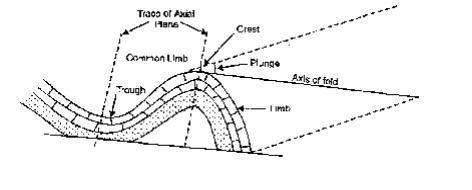Chapter: Civil : Engineering Geology : Structural Geology And Geophysical Method
Structural Geology: Parts of Folds

Structural
Geology: Folds
PARTS OF A FOLD
Limbs
Ø These are the sides or flanks of a fold. An individual fold will have a minimum of two limbs but when the folds occur in groups, as they very often do, a middle limb will be common to two adjacent folds.
Hinge
Ø In a
folded layer, a p oint can be found where curvature is maximum and one limb
ends and the other li mb starts from that point. This is the hinge poin t.
Ø When
rocks occur in a sequence and their all hinge points are joined together, they
make a line, called the hinge line.
Axial surface
Ø When the
hinge line is traced throughout the depth of a folded sequence a surface is
obtained which may be planar or non-planar. It is referred to as axial surface
Axial plane
Ø Axial
plane is the im aginary plane that passes through all the points of maximum
curvature inclined or horizontal in nature.
Ø A fold
surface is plan ar in nature; otherwise it in a folded sequence.
Ø It may be
vertical, is sometimes called a planar fold if the axial is a n on-planar fold.
Axis of a fold
Ø It is simply defined a s a line drawn
parallel to the hinge line of a fold .
Ø A more
precise defin ition of an axis of a fold would be the line repr esenting the
intersection of the ax ial plane of a fold with any bed of the fold.
Plunge of a fold
Ø The angle
of inclination of the fold axis with the horizontal as meas ured in a vertical
plane is term ed the plunge of the fold.
Crest and Trough.
Ø Most folds are variations of two general forms;
uparched and downarched bends. The line running thr ough the highest points in
an uparched fold defi nes its crest.
Ø A corresponding lin e running through the lowest
point in a down arched fold makes its trough. The crest and trough may or may
not coincide wit h the axis of the fold.
Related Topics